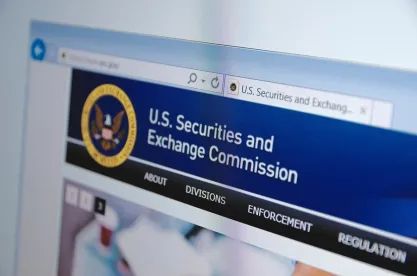A Securities and Exchange Commission (“SEC”) plan to create a registration exemption for certain finders has generated a mixed response. The nearly 90 comments received by the SEC by the November 12, 2020 close of the comment period reflect a clear divide along predictable lines. Broker-dealers, issuers, and some practitioners lauded the proposal for bringing regulatory clarity to what has long been a cloudy issue while regulatory groups and investor advocates criticized the plan for allowing unregistered finders to conduct brokerage activities without sufficient investor protection mechanisms.
Under Section 15(a)(1) of the Securities Exchange Act of 1934 (“Exchange Act”), 15 U.S.C. § 78o(a)(1), it is unlawful for “any broker or dealer . . . to effect any transactions in, or to induce or attempt to induce the purchase or sale of, any security . . . unless such broker or deal is registered.” Section 3(a)(4) of the Exchange Act, 15 U.S.C. § 78c(a)(4), defines “broker” as “any person engaged in the business of effecting transactions in securities for the account of others.” Historically, the SEC has relied on these two provisions to require registration for a person or entity seeking to be paid “transaction-based compensation” (i.e. compensation based on a percentage of the funds raised).[1] Transaction-based compensation gives finders a so-called “salesman’s stake” in the transaction, which, in turn, creates fertile ground for misconduct.
The SEC’s historical antagonism toward unregistered finders has been problematic for small issuers to engage registered broker-dealers, who are not particularly enthusiastic to undertake modest raises because they do not generate lucrative fees. The SEC’s new proposal would help smaller issuers raise capital by allowing unregistered finders to receive transaction-based compensation for connecting issuers with accredited investors, so long as the transactions are limited to accredited investors in private markets.[2]
The SEC proposal creates two types of finders. Tier I Finders would be allowed to provide a list of potential investors in connection with only one issuer once every 12 months, without having any discussions with investors. Tier II Finders would be able to perform broader services in soliciting investors. They would be allowed to identify potential investors on behalf of issuers, discuss offering materials with potential investors, and even participate in meetings with the issuer and prospective investor. However, Tier II Finders may not “provide advice as to the valuation or advisability of the investment” and would be required to disclose their role and compensation at the time of the solicitation.
Supporters of the proposal lauded the new exemption as bringing much-needed clarity to the role played by finders, especially for small issuers. One long-time securities practitioner specifically cited the ability to offer better guidance to small business issuers on their use of unregistered finders. In another comment, a broker-dealer favored the proposal as a necessary recognition of the finders’ role in introducing an investment opportunity. The broker-dealer requested that broker-dealers, not only issuers, should also be allowed to pay finders. The reasoning was that sometimes broker-dealers know someone (not a broker-dealer or licensed person) who has a relationship with target investors. It would be beneficial for broker-dealers to pay that person (i.e., finder) to make the introduction in those instances. Further, an attorney representing venture capital-backed startups fully supported the new exemption and asked to broaden the exemption to allow, not only individuals, but also small corporations to act as finders. The attorney believed that an individual finder acting in a sole proprietorship would likely incorporate, and the exemption should reflect this reality.
On the other hand, some investor champions viewed the proposal as a threat to the existing investor protection mechanisms. The North American Securities Administrators Association (“NASAA”), whose aim is to protect investors, warned that the new exemption would lead to more frauds against unsophisticated investors because the proposal contains insufficient controls over finders. Unlike registered broker-dealers, finders would not be subject to licensing, registration, and examination requirements. Without such controls, NASAA claims that finders could be motivated to connect investors to issuers with poor prospects just to generate commissions. The Public Investors Advocate Bar Association (“PIABA”), an international bar association that consists of attorneys representing investors, likewise opposed the proposal. Specifically, PIABA noted that prohibiting Tier II Finders from advising on the valuation or advisability of the investment is “only a restriction in form, not substance.” In other words, Tier II Finders would be able to discuss offering materials in favorable terms with potential investors, without explicitly stating, “you should invest.” In effect, finders would be conducting traditional brokerage activities without being registered.
Whether the SEC will implement the proposal remains to be seen. The SEC could implement the proposal as is, amend it to address the concerns raised by investor advocates, or scrap it altogether. Nevertheless, by merely proposing the plan, the SEC has demonstrated its recognition of the need to create alternative capital raising channels, particularly those that benefit smaller issuers.
FOOTNOTES
[1] See Securities Exchange Act Rel. No. 61884 (Apr. 9, 2010) (“the receipt of transaction-based compensation often indicates that such a person is engaged in the business of effecting transactions in securities”).
[2] SEC File No. S7-13-20: Notice of Proposed Exemptive Order Granting Conditional Exemption from the Broker Registration Requirements of Section 15(a) of the Securities Exchange Act of 1934 for Certain Activities of Finders.




 />i
/>i

